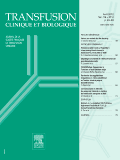
TRANSFUSION CLINIQUE ET BIOLOGIQUE
Scope & Guideline
Innovating transfusion medicine with every publication.
Introduction
Aims and Scopes
- Transfusion Safety and Efficacy:
Research dedicated to ensuring the safety of blood products through rigorous screening, testing, and transfusion protocols to minimize risks associated with transfusions. - Clinical Applications and Management:
Exploration of various clinical practices in transfusion medicine, including patient blood management, the management of specific conditions, and evaluation of transfusion outcomes. - Emerging Technologies and Innovations:
Focus on the application of new technologies in transfusion practices, including molecular techniques, artificial intelligence, and forecasting models for blood component needs. - Ethical and Social Considerations:
Discussion of ethical issues related to blood donation and transfusion practices, including donor deferral policies and the implications of emerging infectious diseases. - Public Health and Epidemiology in Transfusion:
Study of the epidemiological aspects of blood transfusion, including the prevalence of transfusion-transmissible infections and the impact of public health policies on blood safety.
Trending and Emerging
- Patient Blood Management (PBM):
There is a growing emphasis on PBM practices that optimize the use of blood products and improve patient outcomes, reflecting a shift towards more patient-centered approaches in transfusion medicine. - Impact of COVID-19 on Blood Donation and Transfusion Practices:
Research exploring the effects of the COVID-19 pandemic on blood supply, donor behavior, and transfusion practices has surged, indicating an urgent need to adapt to public health challenges. - Molecular and Genetic Testing in Transfusion Medicine:
An increase in studies focusing on molecular testing, including genetic screening for transfusion compatibility and infectious disease detection, showcases the integration of advanced technologies into routine practice. - Ethical Considerations in Transfusion Practices:
There is a notable rise in discussions surrounding the ethical implications of transfusion medicine, particularly regarding donor deferral policies and the management of high-risk populations. - Forecasting and Predictive Modeling for Blood Supply:
The application of predictive models and algorithms to forecast blood component needs and donor behavior is becoming more prevalent, reflecting the journal's commitment to innovative practices in transfusion management.
Declining or Waning
- Traditional Blood Collection Methods:
Research on conventional blood collection techniques and practices is diminishing as newer, more efficient methods are developed, and there is a growing emphasis on automation and technology in blood collection. - Generalized Blood Donation Campaigns:
Public health campaigns that do not target specific donor demographics or motivations are becoming less common as more tailored approaches are adopted to improve donor recruitment and retention. - Focus on Alloimmunization without Contextual Factors:
While alloimmunization remains a concern, the exploration of this issue without considering genetic, environmental, or patient-specific factors is appearing less frequently in recent publications. - In-depth Historical Reviews of Transfusion Practices:
The trend of publishing extensive historical reviews on transfusion practices has decreased, likely due to the focus shifting towards contemporary challenges and innovations in the field. - Single-Disease Focus in Transfusion Research:
Research centered exclusively on single diseases without considering broader implications or interdisciplinary approaches is becoming less prevalent, as there is a push for more holistic studies.
Similar Journals
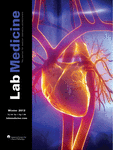
AMERICAN JOURNAL OF CLINICAL PATHOLOGY
Fostering Excellence in Pathology and Clinical PracticeThe American Journal of Clinical Pathology, published by Oxford University Press Inc, stands as a vital resource in the fields of pathology and clinical medicine. With a rich history dating back to 1945 and an impressive impact factor reflected in its Q1 ranking in Pathology and Forensic Medicine, this journal serves as a cornerstone for researchers and professionals seeking to advance their knowledge and practice. Covering a breadth of topics within the discipline, it is recognized in 2023 as ranked #24 out of 208 in its category, highlighting its esteemed reputation within the scientific community. Although the journal does not currently offer open access, its rigorous peer-reviewed articles and cutting-edge research make it an essential addition to any academic or clinical library. The ISSN for print version is 0002-9173, with an E-ISSN of 1943-7722 available for digital access. Researchers, students, and practitioners alike will benefit from its comprehensive scope and commitment to disseminating high-quality scientific inquiry.
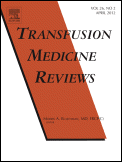
TRANSFUSION MEDICINE REVIEWS
Pioneering research for better blood health.TRANSFUSION MEDICINE REVIEWS is a prestigious journal dedicated to the advanced study of transfusion medicine and its related fields, published by W B SAUNDERS CO-ELSEVIER INC. With an outstanding reputation, it boasts an impressive impact factor and consistently ranks in the top quartile (Q1) across multiple categories, including Biochemistry (Medical), Clinical Biochemistry, and Hematology. Researchers will find valuable insights through its extensive coverage of pertinent topics, with a focus on the integration of clinical practices and laboratory science. While the journal does not currently offer open access, its content remains accessible through various institutional subscriptions, ensuring that vital information is available to the global scientific community. With a continuous publication history from 1987 to 2024, TRANSFUSION MEDICINE REVIEWS serves as a vital resource for academics, healthcare professionals, and students who seek to stay abreast of the latest research findings and clinical practices in transfusion medicine.
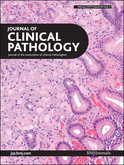
JOURNAL OF CLINICAL PATHOLOGY
Advancing the Future of Clinical InsightsJOURNAL OF CLINICAL PATHOLOGY, published by BMJ PUBLISHING GROUP, stands at the forefront of advancements in the field of clinical pathology, offering a platform for groundbreaking research and insights from 1948 to the present. With an impressive impact factor and categorized as Q1 in both Medicine (miscellaneous) and Pathology and Forensic Medicine for 2023, the journal holds a distinguished position in the academic community, ranking 22nd out of 208 journals in its category on Scopus and representing the 89th percentile. While the journal does not currently offer open access, it remains a vital resource for researchers, healthcare professionals, and students seeking to stay current with innovative methodologies, clinical techniques, and diagnostic advancements. Located in London, United Kingdom, the journal aims to bridge the gap between laboratory findings and clinical practice, emphasizing the importance of evidence-based pathology in improving patient care and treatment outcomes. Engage with the JOURNAL OF CLINICAL PATHOLOGY to enhance your understanding and contribute to the evolving landscape of clinical pathology research.
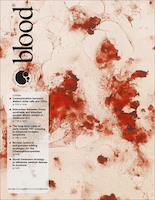
BLOOD
Exploring the Depths of Blood Science.BLOOD, published by the American Society of Hematology, is a premier peer-reviewed journal in the fields of Biochemistry, Cell Biology, Hematology, and Immunology. With an impressive impact factor and ranking in the top quartiles (Q1) across multiple disciplines, BLOOD is essential reading for researchers and professionals seeking to stay updated on the latest advancements in hematology and related fields. The journal has been a cornerstone of hematological research since its inception in 1946, providing a platform for rigorous scientific inquiry and discourse. Its commitment to publishing high-quality original research, comprehensive reviews, and insightful editorials makes it a vital resource for students, practitioners, and scientists alike. By offering exceptional access to influential publications, BLOOD continues to shape the future of hematology and enhance understanding of blood-related disorders, marking its vital role in advancing both basic and clinical research.
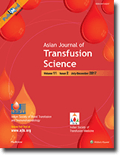
Asian Journal of Transfusion Science
Fostering collaboration in the heart of transfusion science.Asian Journal of Transfusion Science, published by WOLTERS KLUWER MEDKNOW PUBLICATIONS, is a prominent open-access journal dedicated to the interdisciplinary fields of hematology and immunology. With an ISSN of 0973-6247 and E-ISSN 1998-3565, it serves as a crucial platform for researchers, clinicians, and students from around the globe, facilitating the dissemination of high-quality, peer-reviewed research. Established in 2007, the journal has consistently aimed to advance scientific knowledge in transfusion practices, enhancing patient care and safety in transfusion medicine. Despite its recent categorization in the Q4 quartile within both Hematology and Immunology, the journal is making strides toward greater visibility in the academic community, with plans for expanded reach and increased citation impact. With its commitment to open-access publishing, the Asian Journal of Transfusion Science ensures that invaluable research findings are readily accessible to all stakeholders, thereby bolstering collaborative efforts in transfusion science and related disciplines.

GEMATOLOGIYA I TRANSFUZIOLOGIYA
Transforming Insights into Lifesaving PracticesGEMATOLOGIYA I TRANSFUZIOLOGIYA is an esteemed journal published by the MINISTERSTVO ZDRAVOOKHRANENIYA in the Russian Federation, focusing on the vital fields of hematology and transfusion medicine. With a rich history dating back to its inception in 1983, the journal plays a significant role in disseminating critical research and advancements in these areas, particularly relevant given the evolving landscape of medical science. As a recognized publication, it is indexed in Scopus and holds a Q4 category ranking in Hematology for 2023, reflecting its niche but important contributions to the field. Researchers, healthcare professionals, and students can look forward to a variety of peer-reviewed articles that not only address contemporary issues but also pave the way for innovative practices in hematology. Although it does not currently offer open access, the journal remains a valuable resource for those seeking to stay informed about the latest findings and developments.

Blood Research
Fostering Excellence in the Study of Blood DisordersBlood Research, published by SPRINGER, is a premier journal dedicated to the multifaceted realm of hematology, serving as a crucial platform for disseminating innovative research findings and advancements in the diagnosis and treatment of blood-related disorders. With an ISSN of 2287-979X and an E-ISSN of 2288-0011, this journal is recognized for its commitment to scholarly excellence and impact in the field, currently holding a reputable Q2 ranking in the Hematology category as per the 2023 metrics. The journal spans from 2013 to 2024, providing a broad archive of quality research that is vital for researchers, healthcare professionals, and students alike. Although it is not an Open Access journal, it offers insightful contributions that enhance the understanding of hematological science, fostering the exchange of knowledge crucial for advancing patient care and clinical practices globally. The journal’s performance is underscored by its Scopus ranking in the 46th percentile, reflecting its significant role in the ongoing discourse in hematology.
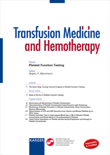
TRANSFUSION MEDICINE AND HEMOTHERAPY
Enhancing global health with impactful transfusion studies.TRANSFUSION MEDICINE AND HEMOTHERAPY, published by KARGER, is a prominent journal dedicated to advancing the fields of hematology and transfusion medicine. With an ISSN of 1660-3796 and E-ISSN 1660-3818, this esteemed journal has been a valuable resource for researchers and clinicians since its inception in 1973, with significant publication phases continuing into 2024. It currently holds a Q2 ranking in Hematology and a Q3 ranking in Immunology and Allergy, reflecting its impact and relevance in these critical fields. The journal features original articles, reviews, and clinical studies, presenting cutting-edge research that aids in the development of effective therapies and enhances patient care. Open access options are available, ensuring that crucial findings are accessible to a broad audience. As an important platform for dialogue and advancement in transfusion science, TRANSFUSION MEDICINE AND HEMOTHERAPY supports the global health community's efforts to improve treatment outcomes and foster innovation in medical practices.
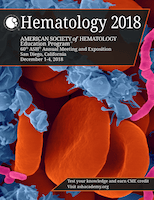
Hematology-American Society of Hematology Education Program
Cultivating Expertise in Blood HealthHematology-American Society of Hematology Education Program is a premier peer-reviewed journal dedicated to advancing the field of hematology through comprehensive educational content. Published by the American Society of Hematology, this journal plays a crucial role in disseminating knowledge to researchers, clinicians, and students in hematology and related disciplines. With an impressive Q1 status in the field, it ranks among the top journals at the forefront of hematological research, as evidenced by its 60th percentile ranking in Scopus' Medicine - Hematology category. Although it does not offer open access, the journal provides invaluable insights and educational resources from leading experts, focusing on the latest advancements, treatment protocols, and evolving understanding of blood disorders. Covering a wide range of topics, from basic research to clinical applications, this journal is essential for anyone seeking to deepen their expertise and stay informed on the latest developments in hematology. For further engagement, readers can access insightful articles published since 2001, ensuring a rich repository of knowledge for ongoing research and clinical excellence.

INTERNATIONAL JOURNAL OF HEMATOLOGY
Advancing the Science of Blood HealthThe INTERNATIONAL JOURNAL OF HEMATOLOGY, published by SPRINGER JAPAN KK, serves as a critical platform for advancing research in the field of hematology. With a prestigious history spanning over three decades from 1991 to 2024, this journal is recognized for its impactful contributions, evidenced by its Q2 category ranking in Hematology for 2023, and its notable position at rank #71 out of 137 in the Scopus Medicine Hematology category. Researchers and professionals within the hematology community benefit from the journal's rigorous peer-reviewed articles that cover a wide range of topics, including clinical studies, basic research, and novel therapeutic strategies. Though currently non-open access, it provides essential insights and findings to an audience passionate about the latest advancements in blood disorders and treatments. Situated in Japan, the journal not only showcases high-quality research but also fosters a global exchange of knowledge in hematology, making it a significant resource for scholars, practitioners, and students alike.